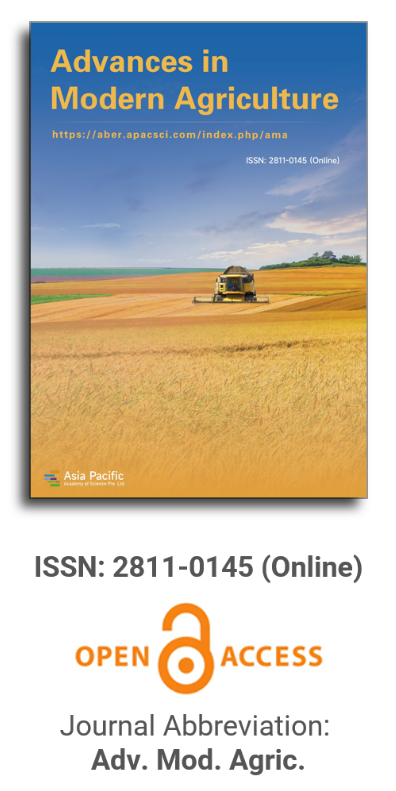


Understanding factors intercepting response of rice farmers to climate change in Ebonyi State, Nigeria
Vol 4, Issue 2, 2023
VIEWS - 3332 (Abstract)
Download PDF
Abstract
Understanding factors intercepting the response of rice farmers to climate change in Ebonyi State, Nigeria, was investigated. A total of 70 rice farmers were sampled using a multi-stage sampling technique and administered a questionnaire. Primary data was collected and analyzed using descriptive statistics (mean, frequency, percentage, chart) and an ordinary least squares multiple regression model. Results show that the rice farmers cultivated on small land holdings, were relatively educated, sourced their land via inheritance, and had 16 years of farming experience. Results reveal that 72% of the rice farmers are highly aware of climate change, while 17% and 11% are relatively aware and not aware, respectively. Temperatures, rainfall, and the number of rainy days have positive effects on rice production, while sunshine hours and relative humidity have negative effects on rice production. Age, gender, education, farm size, extension contacts, and participation in workshops were significant variables influencing rice production in the state. Capital, crude implements, pests and diseases, poor soil, lack of incentives, and cultivation systems were the non-climatic factors that influenced rice cultivation in the state. Farmers were recommended to embrace climate-smart cropping systems and seek early climate change information to mitigate the adverse effects of climate change on rice cultivation.
Keywords
References
- Saud S, Wang D, Fahad S, et al. Comprehensive impacts of climate change on rice production and adaptive strategies in China. Frontiers in Microbiology 2022; 13: 926059. doi: 10.3389/fmicb.2022.926059
- Climate change is an increasing threat to Africa. Available online: https://unfccc.int/news/climate-change-is-an- increasing-threat-to-africa (accessed on 27 October 2020).
- Cai C, Li G, Yang HL, et al. Do all leaf photosynthesis parameters of rice acclimate to elevated CO2, elevated temperature, and their combination, in face environments? Global Change Biology 2018; 24(4): 1685–1707. doi: 10.1111/gcb.13961
- Chandio AA, Jiang Y, Rehman A, Rauf A. Short and long-run impacts of climate change on agriculture: An empirical evidence from China. International Journal of Climate Change Strategies and Management 2020; 12(2): 201–221. doi: 10.1108/IJCCSM-05-2019-0026
- Chen C, van-Groenigen KJ, Yang H, et al. Global warming and shifts in cropping systems together reduce China’s rice production. Global Food Security 2020; 24: 100359. doi: 10.1016/j.gfs.2020.100359
- FAO. Nigeria agriculture at a glance. Available online: https://www.fao.org/nigeria/fao-in-nigeria/nigeria-at-a-glance/en/ (accessed on 14 September 2023).
- Deng A, Chen C, Feng J, et al. Cropping system innovation for coping with climatic warming in China. The Crop Journal 2017; 5(2): 136–150. doi: 10.1016/j.cj.2016.06.015
- Nwali NI, Okoro FN. Analysis of climate change effects on rice output in Ebonyi State, Nigeria: 1990–2015. In: Proceedings of the 2017 Annual NAAE Conference; 16–19 October 2017; Abeokuta, Nigeria. pp. 591–596.
- FAO. The state of food and agriculture 2019. Available online: https://www.fao.org/3/ca6030en/ca6030en.pdf (accessed on 14 September 2023).
- Chen K, Horton RM, Bader DA, et al. Impact of climate change on heat-related mortality in Jiangsu Province, China. Environmental Pollution 2017; 224: 317–325. doi: 10.1016/j.envpol.2017.02.011
- Ding Y, Wang W, Zhuang Q, Luo Y. Adaptation of paddy rice in China to climate change: The effects of shifting sowing date on yield and irrigation water requirement. Agricultural Water Management 2020; 228: 105890. doi: 10.1016/j.agwat.2019.105890
- Adeagbo OA, Ojo TO, Adetoro AA. Understanding the determinants of climate change adaptation strategies among smallholder maize farmers in South-West, Nigeria. Heliyon 2021; 7(2): e06231. doi: 10.1016/j.heliyon.2021.e06231
- Agovino M, Casaccia M, Ciommi M, et al. Agriculture, climate change and sustainability: The case of EU-28. Ecological Indicators 2019; 105: 525–543. doi: 10.1016/j.ecolind.2018.04. 064
- Ahmad M, Jiang P, Majeed A, Raza MY. Does financial development and foreign direct investment improve environmental quality? Evidence from belt and road countries. Environmental Science and Pollution Research 2020; 27: 23586–23601. doi: 10.1007/s11356-020-08748-7
- Ahsan F, Chandio AA, Fang W. Climate change impacts on cereal crops production in Pakistan. International Journal of Climate Change Strategies and Management 2020; 12(2): 257–269. doi: 10.1108/IJCCSM-04-2019-0020
- FAO. Crop prospects and food situation. Available online: https://www.fao.org/documents/card/en/c/cc0868en (accessed on 14 September 2023).
- Igberi CO, Osuji EE, Anuli RO, et al. Climate smart adaptive measure of yellow cassava, linkages and implications in Southeast Nigeria. Agrociencia 2022; 56(3): 1–32. doi: 10.47163/1646.Ag.
- Ikuemonisan ES, MafimisebiTE, Ajibefun I, Adenegan IK. Cassava production in Nigeria: Trends, instability and decomposition analysis (1970–2018). Heliyon 2020; 6(10): e05089. doi: 10.1016/j.heliyon.2020.e05089
- Kumar P, Chandra NS, Kumar S, Ansari MA. Impact of climate change on cereal production: Evidence from lower-middle-income countries. Environmental Science and Pollution Research 2021; 28: 51597–51611. doi: 10.1007/s11356-021-14373
- Dou Z, Tang S, Chen WZ, et al. Effects of open-field warming during grain-filling stage on grain quality of two japonica rice cultivars in lower reaches of Yangtze River delta. Journal of Cereal Science 2018; 81: 118–126. doi: 10.1016/j.jcs.2018.04.004
- Espe MB, Hill JE, Hijmans RJ, et al. Point stresses during reproductive stage rather than warming seasonal temperature determine yield in temperate rice. Global Change Biology 2017; 23(10): 4386–4395. doi: 10.1111/gcb.13719
- Guo Y, Wu W, Liu Y, et al. Impacts of climate and phenology on the yields of early mature rice in China. Sustainability 2020; 12(23): 10133. doi: 10.3390/su122310133
- Tajudeen TT, Omotayo A, Ogundele FO, Rathbun LC. The effect of climate change on food crop production in Lagos State. Foods 2022; 11(24): 3987. doi: 10.3390/foods11243987
- Arora NK. Impact of climate change on agriculture production and its sustainable solutions. Environmental Sustainability 2019; 2: 95–96. doi: 10.1007/s42398-019-00078-w
- Onyeneke RU, Amadi MU, Njoku CL, Osuji EE. Climate change perception and uptake of climate smart agriculture in rice production in Ebonyi State, Nigeria. Atmosphere 2021; 12(11): 1503. doi: 10.3390/atmos12111503
- Osuji EE, Okwara MO, Essien UA, et al. Sustainability of climate change adaptation measures in South-South, Nigeria. Agriculture and Food Sciences Research 2019; 6(1): 120–126.
- Diagi BE, Nwagbara MO. Perceived impact of climate change on swamp rice cultivation by farmers in Ebonyi State, Southeastern Nigeria. Archives of Current Research International 2018; 14(2): 1–10. doi: 10.9734/ACRI/2018/41176
- Onyeneke RU. Determinants of adoption of improved technologies in rice production in Imo State, Nigeria. African Journal of Agricultural Research 2017; 12(11): 888–896. doi: 10.5897/AJAR2016.11737
Supporting Agencies
Copyright (c) 2023 E. E. Osuji, A. C. Tim-Ashama, U. T. Agunanne, R. A. Iheanacho, S. C. Onyirioha, J. Nze
License URL: https://creativecommons.org/licenses/by/4.0/

This site is licensed under a Creative Commons Attribution 4.0 International License (CC BY 4.0).

Prof. Zhengjun Qiu
Zhejiang University, China

Cheng Sun
Academician of World Academy of Productivity Science; Executive Chairman, World Confederation of Productivity Science China Chapter, China
Indexing & Archiving
In the realm of modern agriculture, the integration of cutting-edge technologies is revolutionizing the way we approach sustainable farming practices. A recent study published in Advances in Modern Agriculture titled "Classification of cotton water stress using convolutional neural networks and UAV-based RGB imagery" has garnered significant attention for its innovative approach to precision irrigation management. Conducted by researchers from Institute of Data Science and the AgriLife Research and Extension Center of Texas A&M University (authors's information is below). This study introduces a novel method for classifying cotton water stress using unmanned aerial vehicles (UAVs) and convolutional neural networks (CNNs), offering a powerful solution for optimizing water use in agriculture.
Modern agricultural technology is evolving rapidly, with scientists collaborating with leading agricultural enterprises to develop intelligent management practices. These practices utilize advanced systems that provide tailored fertilization and treatment options for large-scale land management.
This journal values human initiative and intelligence, and the employment of AI technologies to write papers that replace the human mind is expressly prohibited. When there is a suspicious submission that uses AI tools to quickly piece together and generate research results, the editorial board of the journal will reject the article, and all journals under the publisher's umbrella will prohibit all authors from submitting their articles.
Readers and authors are asked to exercise caution and strictly adhere to the journal's policy regarding the usage of Artificial Intelligence Generated Content (AIGC) tools.
Asia Pacific Academy of Science Pte. Ltd. (APACSCI) specializes in international journal publishing. APACSCI adopts the open access publishing model and provides an important communication bridge for academic groups whose interest fields include engineering, technology, medicine, computer, mathematics, agriculture and forestry, and environment.



.jpg)
.jpg)

.jpg)
